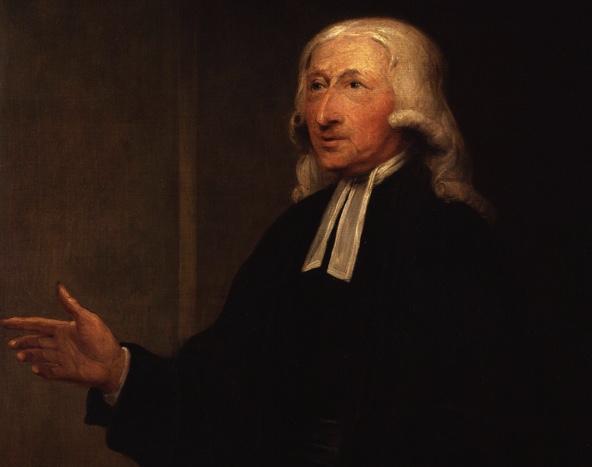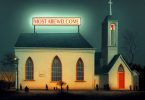What is a Wesleyan Approach to Reading the Bible?
The Wesleyan Covenant Association (WCA) is a group that wants to break away from the United Methodist Church. Many WCA members say the United Methodist Church has shifted too far away from teaching basic Bible truths. Some say one way to fix this is to go back to “plain readings” of the Bible: to let the Bible “say what it says.”
To a lot of people, the idea of letting the Bible “say what it says” sounds good. Here’s how one minister, a member of the WCA, put it during a recent sermon:
“Friends, the Bible interpreted by a plain reading –and as a whole — the Bible must always, always have the last word, even if it makes me uncomfortable. Even if I don’t like it. If the Bible says that red-headed people should only speak French, what should I speak? … French.”
(Rev. Dr. Timothy Prather, New Albany First United Methodist Church, June 6 2021)
Some WCA members would also like you to think that a “plain reading” of the Bible is what John Wesley, the founder of Methodism, liked best. You may have seen members of the WCA sharing this quote on Facebook lately:

At first, this quote can make it seem John Wesley liked a “plain reading” of the Bible best. In fact, Wesley himself didn’t always read the Bible this way. For an example, we need look no further than what 1 Corinthians 14:34-35 says about women’s role in the church … and compare that to what Wesley said and did when God called female Methodists to preach.
A Plain Message: Women “are not allowed to speak!”
“Women should remain silent in the churches. They are not allowed to speak, but must be in submission, as the law says. If they want to inquire about something, they should ask their own husbands at home; for it is disgraceful for a woman to speak in the church.”
1 Corinthians 14:34-35
A “plain reading” of this verse says that women shouldn’t be allowed to speak a single word in church. Women who have questions must get answers from their husbands at home. The verse even goes so far as to say women speaking out in church is a “disgraceful” or shameful thing.
(That’s the same word used in Ephesians 5, where the Bible says sexual sins, impurities, greed, dirty talking, and idolatry are so “shameful” they shouldn’t even be mentioned out loud.) In other words: this “plain reading” of the Bible says women who speak out in church have done something as shameful as sinning sexually, being greedy, talking dirty, or worshipping other gods!
Just in case 1 Corinthians 14 wasn’t “plain” enough, 1 Timothy 2:11-14 says more:
Let a woman learn quietly with all submissiveness. I do not permit a woman to teach or to exercise authority over a man; rather, she is to remain quiet. For Adam was formed first, then Eve; and Adam was not deceived, but the woman was deceived and became a transgressor.
1 Timothy 2:11-14
A “plain reading” of this verse says women should be silent and submit to men. They cannot teach. They cannot do anything that makes them seem to have more “say-so” than men. And it goes further, giving two reasons why women should be “second class citizens.” First, Eve was created after Adam. Second, Eve sinned before Adam did.
The John Wesley quote being shared on Facebook implies we are not to question what God “has plainly written” in the Bible. And a “plain reading” of these two verses says women should never teach or have any power in church. So when Methodist women claimed God had called them to preach, what did John Wesley do about these verses?
The truth is this: instead of a “plain reading,” he read those scriptures with tradition, experience, and reason in mind.
The Rise of Female Methodist Ministers
At first, Sara Crosby didn’t care much for Methodism. But after reading John Wesley’s books, she joined the church in 1752. She began teaching classes right away, and people really liked them. That same year, she claimed to have a vision of Jesus, who said, “Feed my lambs.” Crosby took this to be God calling her to preach.
Five years later, a woman named Mary Bosanquet attended one of Crosby’s classes. Crosby got Bosanquet to join the church and give her life to the work of the spirit. She also got Bosanquet to join her and another woman, Sarah Ryan, in a ministry to orphans and the poor.
In 1761, Wesley sent Crosby to lead a Bible class in a town called Derby. In no time at all, the number of people in the class went from fifty to over two hundred. Because Crosby’s way of teaching small classes didn’t work well with big crowds, she started preaching instead.
Crosby wrote a letter to Wesley, telling him she had started preaching. At first, Wesley worried what men would think of a woman preaching. He asked her to try not to look or sound too much like a preacher, or to “testify” rather than preach … but he also told her to keep up the good work.
Over time, Wesley warmed up more to the idea of a woman preaching. In 1769, even though male Methodist leaders didn’t like it, he told Crosby she could start giving spiritual advice in her sermons. Crowds flocked to hear her speak. Once, she drew a crowd of 500-600 people while preaching with laryngitis … in the rain!
Why Wesley Let Women Preach
In 1771, Mary Bosanquet wrote a letter to Wesley telling him why she thought she and other women like Crosby should be allowed to preach. She didn’t try to use the Bible to prove her point. Instead, she said women who had “an extraordinary call” to preach should be allowed to do so.
The letter convinced Wesley that women called by God to preach should do so. At first, he asked Bosanquet not to quote scripture in her sermons. But when she did anyway, Wesley did nothing to stop her. By 1776, Bosanquet’s sermons were drawing crowds of more than two thousand people.
In a book about Wesley giving women the right to preach (Early Methodist Women, 1967), Thomas M. Morrow notes that Wesley’s reasons for doing so at first had less to do with Scripture than with the fact that women were very good at drawing crowds and getting people to join the church!
Later, though, when defending female preachers, Wesley would cite Acts 2. He claimed God was doing extraordinary work in Methodism, just as God had among the first Christians. He said God pours out the Spirit without being “a respecter of persons,” and he cited Galatians 3:28: “There is neither Jew nor Greek, there is neither slave nor free, there is neither male nor female; for you are all one in Christ Jesus.”
In 1786, Wesley began letting other women preach. Angry men quoted 1 Corinthians 14 and 1 Timothy 2, arguing that the Bible plainly said women should remain silent. But in a sermon that same year, Wesley said:
“But may not women, as well as men, bear a part in this honorable service? Undoubtedly they may; nay, they ought; it is meet, right, and their bounded duty … It has long passed for a maxim with many that ‘women are only to be seen but not heard.’ … It is the deepest unkindness; it is horrid cruelty; it is mere Turkish barbarity. And I know not how any women of sense and spirit can submit to it.”
John Wesley
Despite objections from many male Methodists, Sara Crosby continued preaching until her death in 1804. When Bosanquet died in 1814 at the ripe old age of 75, she was still preaching five times a week.
Wesley: Ahead of His Time
After Wesley’s death in 1791, it didn’t take long for people to start trying to turn back the clock. The church split many times over many issues, including the role of women. While some Methodist groups gave women full rights to preach, others tried to silence them. At general conferences (large meetings of church leaders), men gave three reasons for keeping women silent:
- 1 Corinthians 14 and 1 Timothy 2
- The service roles that women needed to fill in homes and work places
- An important Bishop, Edward G. Andrews, said women preaching went against church law.
The battle dragged on for years. In 1880, a woman named Anna Oliver earned a degree in theology from Boston University and served two churches with great success. At a church conference, she argued it was time to edit the Book of Discipline (a book that sets out the laws and some teachings of the church) to allow women to preach. She pointed to:
- the natural gifts that make women especially good pastors
- the great need in the mission field
- the Golden Rule
- the need to do what was charitable and fair
- the question, “What Would Wesley Do?”
The men in her branch of the Methodist Church responded by denying her motion … and taking back all the preaching licenses that had been given to women in the past!
Some groups allowed women to preach, but others didn’t. By 1945, only three female preachers remained in the Methodist conference. One woman, Lea Joyner, was told no church would have her as a preacher. Even so, she was given $5000 and a vacant lot as an experiment. The church she built grew to more than 2200 members! At the time, this was the largest Methodist Church pastored by a woman in the world.
It would be 1956 before the General Conference changed the fate of women by addition a single line to the part of the Book of Discipline that described the job of ministers: “All foregoing paragraphs, chapters, and sections … shall apply to women as well as to men.” In 1968, when the United Methodist Church was created, the church granted full clergy rights to all women.
Today, the UMC has more than 12,000 women preaching and holding powerful roles in church offices — honoring Wesley’s practice of letting women preach even over a what a “plain reading” of 1 Corinthians 14 and 1 Timothy 2 would seem to say.
A “Plain Reading” vs. A Truly Wesleyan Approach to Scripture
John Wesley’s ability to go beyond a “plain reading” of the Bible let him do what fairness and practicality demanded. This led him to preach a radical message that upset powerful men, challenged what society was ready to hear, and took more than a century to be accepted by the church he founded.
While Wesley did say Scripture comes first, the Book of Discipline says, “… even when grounded in Scripture and mediated by tradition, [Christian witness] is ineffectual unless understood and appropriated by the individual. To become our witness, it must make sense in terms of our own reason and experience.” In other words, when we read the Bible, we have to think about what’s been done in the past, what we’ve been through ourselves, and what our God-given common sense tells us.
The Wesleyan Covenant Association likes talking about “plain readings” of the Bible and claiming that their way of reading Scripture is closest to Wesley’s way. But even though they march under the banner of Wesley’s name, history tells us that their approach to “plain readings” of the Bible has little in common with Wesley … and a lot in common with the angry church leaders who fought to bar women from the pulpit for more than a hundred years.
What Would Wesley Do … Today?
Once again, the United Methodist Church is under attack from powerful people who want control over who gets to preach … and who must be kept from preaching.
But groups like the Wesleyan Covenant Association are Wesleyan in name only. Rather than honor the Wesleyan tradition of being ahead of their time, they seek to turn back the clock. Rather than honoring God’s call to preach, they seek to prevent gay and lesbian people from answering that call (even though Jesus never said a word about gay people and the Bible says nothing about barring them from the ministry).
And rather than read the Bible in the way Wesley taught and practiced, they call for “plain readings” of the Bible — without considering tradition, experience, or common sense — even when their own practices (like allowing women to preach and lead) go against what a plain reading of the Bible would suggest.
When trying to keep gay and lesbian people out of the pulpit, the WCA also claims they are defending The Book of Discipline (by opposing changes to it). But the Book of Discipline has always been a living document, edited to reflect the thinking of the time. (The current rules that keep gay people from serving as ministers, for example, were only added in the 1970’s.) As Methodist thought shifts and changes, so does The Discipline. That’s the Wesleyan way.
If we must look for a quote that captures John Wesley’s wisdom in these matters, instead of one calling for a “plain reading” of Scripture, we might consider this one:
“When I was young, I was sure of everything; in a few years, having been mistaken a thousand times, I was not half so sure of things as I was before; at present, I am hardly sure of anything but what God has revealed to me.”
John Wesley
If the founder of the Methodist Church could read scripture in context, challenge what society believed to be true, and take action based on what he saw was useful … real United Methodists who want to live by real Wesleyan principles should be able to do the same.
Taking this thoughtful approach may upset some powerful people. It may also move us to do things — like accept gay and lesbian ministers — that our culture still isn’t quite ready for. Let’s hope that, this time, the church won’t take more than a century to come around to Wesley’s way of thinking!
Questions to Consider
- What are the problems with a “plain reading” of the Bible?
- How might reading Scripture with tradition, experience, and reason in mind change how we view a “plain reading” of the Bible?
- What do historical efforts to keep women from preaching have in common with modern-day efforts to keep gay and lesbian people from preaching?
- How might Lea Joyner’s story — she’s the woman given $5000 and a vacant lot, whose church soon swelled to 2000 members — inform our approach to allowing gays and lesbians to preach today? What would happen if the church experimented with allowing some churches to welcome gay and lesbian members, even before the Book of Discipline is changed?
- Frankly, despite what the Book of Discipline says, gay and lesbian ministers exist (in hiding) in the United Methodist Church today. What spiritual and emotional costs are associated with having to hide who you really are? What might happen if these people could devote all the time and energy invested in hiding and channel it into ministering to others instead?
- How might Galatians 3:28 (“There is neither Jew nor Greek, there is neither slave nor free, there is neither male nor female; for you are all one in Christ Jesus.”) apply to the plight of gay and lesbian people who want to preach or hold leadership positions in the church today?
- If a gay or lesbian person feels God’s call to preach, what would Wesley most likely say we should do?







